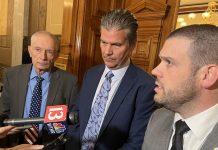Man Must Continue To Pay Child Support For Son He Claimed Was His, Court Holds
Olivia Covington for www.theindianalawyer.com
A divided Court of Appeals panel has affirmed an order requiring a non-biological father to pay child support for his wife’s child, finding that because the man supported the child throughout his life, he is legally estopped from challenging the child support order.
Shortly after his marriage to Ronnie Sheetz in 2002, Benjamin Sheetz was sent to prison. While he was incarcerated, Ronnie Sheetz became pregnant by another man. Together the couple agreed to tell people that she had become pregnant during a conjugal visit, that she would not tell the biological father about the child and that they would raise the baby together as their own.
When the baby was born, Benjamin Sheetz signed the birth certificate as the father and told his wife not to contact the biological father, seek support from him or institute paternity proceedings. When Ronnie Sheetz filed for divorce in May 2014, she claimed that her first child and her other two children with her husband were all children of the marriage. Benjamin Sheetz was ordered to pay child support for all three, and he did not object.
However, Ronnie Sheetz eventually told her first child that Benjamin Sheetz was not his biological father. The Adams Circuit Court subsequently entered findings that concluded that Benjamin Sheetz was “estopped from denying his obligations to (the child)†because “(t)o hold otherwise would be unjust†and “an injustice to a young man who was led to believe that (Benjamin was) his father when he is not.â€
Benjamin Sheetz appealed, arguing that he should not have to pay child support for his ex-wife’s first child because he is not his biological father. Indiana Court of Appeals Chief Judge Nancy Vaidik did not disagree with that fact, but wrote in a Wednesday opinion that there was more to the story.
Specifically, Vaidik pointed to the fact that Benjamin Sheetz had agreed to raise the child as his own and had done so for 12 years, and had went so far as to prevent his ex-wife from instituting paternity proceedings.
“Under these facts, Husband is estopped from rebutting the presumption that he is G.B.S.’s biological father,†Vaidik wrote for the majority.
The decision is based on the doctrine of equitable estoppel, which holds that a party may be precluded by his own actions from asserting a right he would otherwise be able to claim, Vaidik wrote. The doctrine can be invoked when one party “knowingly misleads or induces another party to believe and act upon his conduct in good faith without knowledge of the facts.â€
In the instant case, Vaidik wrote that Benjamin Sheetz induced his ex-wife to believe that he would raise and support G.B.S. as his own child, leading to the passage of her opportunity to file a paternity action against the child’s biological father.
Further, the chief judge wrote that public policy also supported equitable estoppel in the Sheetzes’ situation because if it did not, the child would essentially be left without a father.
However, Judge Edward Najam dissented, writing in a separate opinion that Indiana does not recognize equitable estoppel, adoption by estoppel or in loco parentis as grounds for a child support order because “a child of the marriage†refers only to natural and adoptive parents. Additionally, Najam wrote that Ronnie Sheetz had not stated a claim for equitable relief because she testified that she knows the name of the child’s biological father and, thus, could establish paternity.




